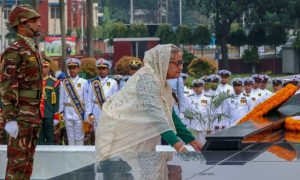Bangladesh’s Awami League (AL) government is pressing ahead with holding general elections in January 2024 amid what Human Rights Watch says is a “violent autocratic crackdown” on the opposition Bangladesh Nationalist Party (BNP).
At least 10,000 opposition activists have been arrested since October 28 and many grassroots activists have fled their homes to avoid arrest and are reportedly spending nights under the sky in boats and remote areas. The AL government is accusing the opposition of instigating violence. Journalists have come upon many “ghost cases,” where BNP men, who were already dead, or now living abroad, were charged with violence in politically motivated cases.
The BNP is boycotting the election, alleging that voting under Prime Minister Sheikh Hasina would not be free and fair. The country’s largest Islamist opposition party, the Jamaat-e-Islami (JI) has been barred from participating in the election.
The BNP has been demanding an election under a neutral caretaker government. The AL government argues that a caretaker government is unconstitutional. The Jatiya Party (JP), the current opposition in parliament, which is locally derided as a “managed opposition” of the ruling party is set to participate in the election.
Besides the AL and JP, several other state-backed smaller parties are preparing to take part in the election. Additionally, Hasina recently ordered her party men to put up dummy candidates in the uncontested seats. The objective is to make the next election appear to be an inclusive and participatory one despite the absence of the main opposition parties.
The 2024 election is likely to be another highly flawed election. This has been the case with every election held under the AL regime since 2014. Elections in 2014 and 2018 that were held under the AL government were widely regarded as one-sided, rigged and flawed. Ballot boxes were stuffed and thousands of phantom voters participated in the elections. Bangladeshi scholar Ali Riaz wrote in Foreign Affairs that during Hasina’s tenure, Bangladesh has turned to autocratic rule.
Against the backdrop of yet another “managed election,” where the Bangladeshi ruling party is set to win without credible opposition and Sheikh Hasina will head the government for fourth consecutive term, a pertinent question is why does the Bangladeshi government even bother to hold election?
Elections are supposed to be a genuine competition between political parties where people can elect their leaders by exercising their voting rights. However, the upcoming election is anything but free and fair. Indeed, analysts and opposition leaders say that Bangladesh is set for an unfair election.
Researchers who have studied elections in authoritarian states elsewhere in the world have intriguing explanations as to why authoritarian governments hold election and these answers are useful to understand what is unfolding in Bangladesh.
In his book “Behind the Façade: Elections under Authoritarianism in Southeast Asia,” Australian researcher Lee Morgenbesser argues that elections in authoritarian regimes provide legitimacy to authoritarian rulers to rule and help them push back against any mass protests that may result from an absence of a free and fair election.
In Bangladesh, Hasina’s AL has some popular support and elections, despite being flawed, have bestowed her with a measure of legitimacy to rule. Thanks to strong diplomatic backing from India, China and Russia, Hasina had managed to remain in power through two flawed elections. Western countries, including the U.S., have raised concerns over the rigging of elections but such criticism was muted, and governments have eventually operated with Hasina. Therefore, elections provided Bangladeshi regimes with national and international legitimacy.
Holding flawed elections also serves the purpose of stability, a point India puts forward to justify its support of the Hasina regime. What stability means in this context may be a matter of debate, but researchers say that elections under an authoritarian regime generally provide safety to the rulers.
Amro Ali, a research fellow at the Heinrich Böll Foundation, who studies elections in authoritarian Middle Eastern societies told The Diplomat that “since authoritarian rulers derive their support from the elites and security establishments, an election acts to secure the ruler and serves as a pre-condition to stability.” An election provides rulers with the “chance to reshuffle their own government and remove any potential threat from within,” he said.
Indeed, while announcing its candidates in 298 constituencies, the AL has not re-nominated 71 of its current members of parliament.
In the Middle Eastern scenario, Amro said that such reshuffling created “an illusion of change, making it appear to the public that the country is undergoing a reset.”
In their book “Spin Dictators: The Changing Face of Tyranny in the 21st Century,” authors Sergei Guriev and Daniel Treisman point out that that modern day authoritarian rulers pretend to be democratic. As the global preference for freedom and democracy has swelled, these ‘spin dictators’ pretend to embrace democracy and freedom.
This is the case with Bangladesh’s ruling “spin dictators.” Elections in Bangladesh are celebration not of voters but of the rulers.

































